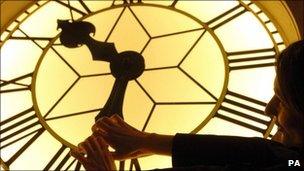Daylight Saving Bill gets initial approval from MPs
- Published

Supporters say lighter evenings would reduce traffic fatalities and boost exercise
The campaign to give the UK more hours of daylight in the evenings has been boosted by MPs who have given it initial approval.
The Daylight Saving Bill requires the government to conduct analysis of the costs and benefits of shifting the clocks forward by an hour for all or part of the year.
If it was found to benefit the whole of the UK, a three-year trial would follow, the bill proposes.
MPs voted by 92 to 10 in support.
The bill now goes for more detailed scrutiny in the Commons.
'No immediate change'
At the end of more of than four hours of debate on Friday, Business Minister Ed Davey said the government opposed the bill, because the "necessary consensus across all parts of the UK does not yet exist to justify a change, or the passing of any legislation on the matter".
However, he offered to publish a review of the available evidence concerning the likely effects of moving to Central European Time.
He said the government would also propose talks with the devolved administrations in Scotland, Wales and Northern Ireland about the issue.
Conservative Rebecca Harris said her bill , externalcould save up to 80 lives a year, mainly among children, by giving Britain lighter evenings.
Ms Harris said: "My bill does not enforce an immediate change, it does not seek to enforce the view of myself or my colleagues on anyone.
"I'm asking that the government should take an objective, informed decision based on the best available evidence so all these questions can be properly looked at before any decision is taken."
She added: "You cannot grow time, you cannot make more of it than you have and you cannot create additional daylight.
"But it is up to us to utilise both as best we can."
Supporters say having lighter evenings would reduce fatal road accidents, boost tourism revenues, promote sport and exercise and reduce energy use.
But critics fear a later sunrise makes the school run more dangerous and presents problems for farmers and outdoor workers, particularly in Scotland.
The SNP strongly criticised the proposals, saying the rejection of a similar move after a trial between 1968 and 1971 should not be ignored as it was based on "sound reasons".
MP Angus MacNeil said: "The progress of this bill is literally a wake-up call to the prospect of dark mornings for everyone north of Manchester, and has been pushed through by MPs from the south with no regard to the impact these changes would have on the quality of life for people in the north.
"This change would be acutely felt in Scotland, raising real safety and quality of life concerns, and this is now a real test for the Tory government and its claims of a respect agenda for Scotland."
- Published29 October 2010